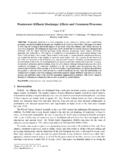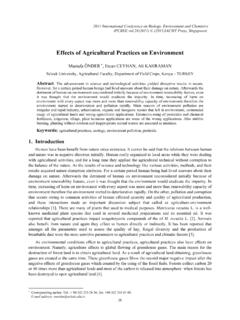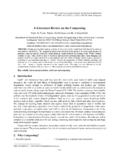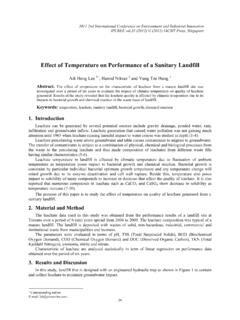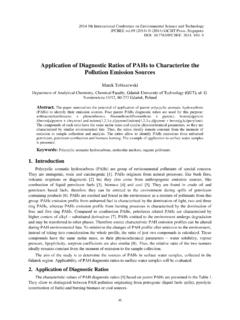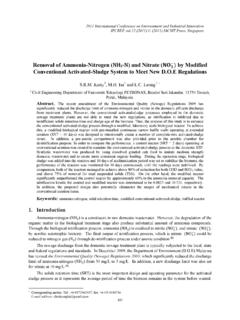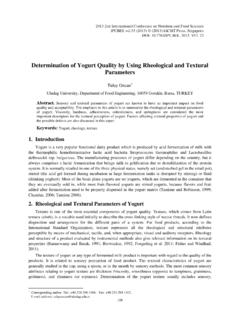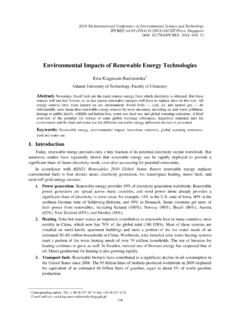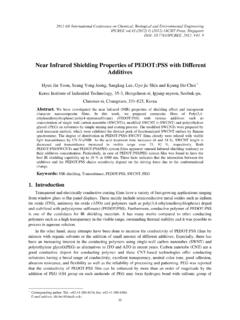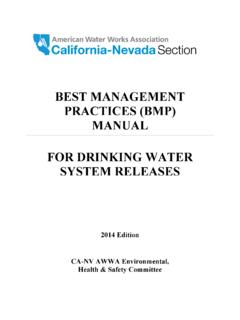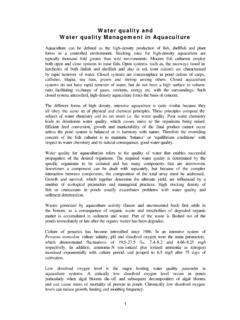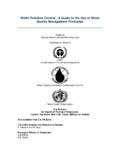Transcription of Water Quality in Developing Countries, South Asia, South ...
1 Water Quality in Developing countries , South Asia, South Africa, Water Quality management and Activities that Cause Water Pollution Somaya Abbaspour Student of Agriculture Engineering- food science & industrial- Islamic Azad University Ayatollah Amoli Branch-IRAN Abstract. Water is the most abundant chemical in the human body and plays a central role in the regulation of nutrient transport, toxic waste removal, thermal regulation, digestion, and organ functioning. About 55-65% of the human body weight comes from Water . To maintain optimal health, the Institute of Medicine advises that men consume roughly liters (about 16 cups) of total Water a day and women consume liters (about 12 cups) of total Water a day.
2 So Water Quality should be grow faster day by day in order to maintain people s health. Protecting Water Quality is a top environmental priority as we approach the twenty-first century. There are many Water Quality problems in both Developing and developed countries . Of all the environmental concerns that Developing countries face, the lack of adequate Water of good Quality is probably the most serious. The sustainable management of Water Quality has policy, technical, institutional and financial components. In many Developing countries restricted funding is usually combined with fragile or unstable institutions and limited technical capabilities to deal with an expanding range of Water Quality problems.
3 At the technical level, there has been great progress in western nations in Developing more cost-effective monitoring, analytical protocols, and assessment methods. This flows not only from better scientific knowledge, but also from recognition that conventional monitoring programs are inefficient, expensive, and often not very useful. Regrettably, financial institutions and ODA programs tend to reinforce conventional approaches in Developing countries with the result that these countries have little opportunity to develop a new, more appropriate and more sustainable data paradigm.
4 In lesser developed countries where public health is the major concern, the traditional model of a centralized monitoring program often does not work, suggesting that a new model of decentralized community-based monitoring would be more effective. All waters contain dissolved salts and trace elements, many of which result from the natural weathering of the earth s surface. In addition, drainage waters from irrigated lands and effluent from city sewage and industrial waste Water can impact Water Quality . Keywords: global Water crisis, Water Quality management , COD, WHO, National Environment Program , Persistent Organic Pollutants 1.
5 Introduction Although the global Water crisis tends to be viewed as a Water quantity problem, Water Quality is increasingly being acknowledged as a central factor in the Water crisis. The fact that some five million persons, mainly children and infants, die annually from Water -borne diseases, was not enough to mobilize international action about Water Quality . There is no doubting the importance that national governments and international financing agencies place on addressing the Water problem. The Water Quality situation in Developing countries is highly variable reflecting social, economic and physical factors as well as state of development.
6 And while not all countries are facing a crisis of Water shortage, all have to a greater or lesser extent serious problems associated with degraded Water Quality . In + Somaya Abbaspour. Tel.: + (9809125646947); E-mail address: 942011 International Conference on Environmental and Agriculture Engineering IPCBEE (2011) (2011) IACSIT Press, Singapore some countries these are mainly associated with rivers, in others it is groundwater, and in yet others it is large lakes; in many countries it is all three.
7 Because the range of polluting activities is highly variable from one country to another, and the nature of environmental and socio-economic impacts is equally variable, there is no "one-size-fits-all" solution. Water Quality is affected by both point and non-point sources of pollution. These include sewage discharge, discharge from industries, run-off from agricultural fields and urban run-off. Water Quality is also affected by floods and droughts and can also arise from lack of awareness and education among users. The need for user involvement in maintaining Water Quality and looking at other aspects like hygiene, environment sanitation, storage and disposal are critical elements to maintain the Quality of Water resources.
8 This paper explore the key aspects of Water Quality management that should enter into national Water programs irrespective of the type of pollution or the type of Water body concerned ,the current status of Water access for households in Developing countries , Agricultural activities that cause NPS pollution and Water Quality South Asia and Africa. These components reflect important technical, institutional, legal, financial and business issues which should be included in national Water policies. 2. Water Quality management Water Quality is changed and affected by both natural processes and human activities.
9 Generally natural Water Quality varies from place to place, depending on seasonal changes, climatic changes and with the types of soils, rocks and surfaces through which it moves. A variety of human activities agricultural activities, urban and industrial development, mining and recreation, potentially significantly alter the Quality of natural waters, and changes the Water use potential. The key to sustainable Water resources is, therefore to ensure that the Quality of Water resources are suitable for their intended uses, while at the same allowing them to be used and developed to a certain extent.
10 Effective management is the tool through which this is achieved. Water Quality management , therefore involves the maintenance of the fitness for use of Water resources on a sustained basis, by achieving a balance between socio-economic development and environmental protection. From a regulatory point of view the "business" of Water Quality management entails the ongoing process of planning, development, implementation and administration of Water Quality management policy, the authorization of Water uses that may have, or may potentially have, an impact on Water Quality , as well as the monitoring and auditing of the aforementioned.
